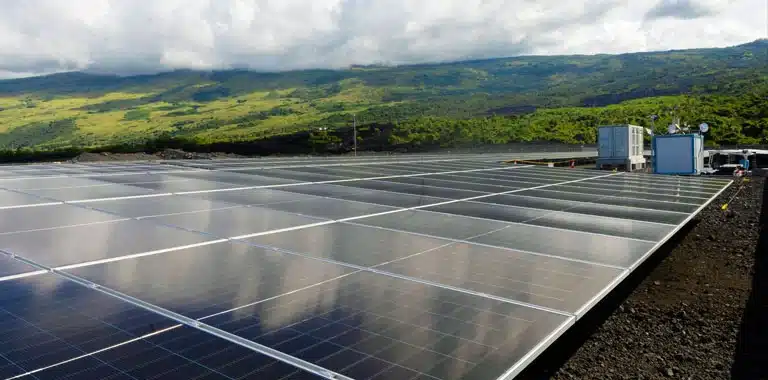Moroni, Comoros — In a landmark step towards a sustainable future, the Comoros solar power plant was officially inaugurated, bringing a transformative 6.3-megawatt clean energy facility to the island nation. Funded by the Abu Dhabi Fund for Development (ADFD) with a contribution of AED 25.7 million (US$7 million), the new infrastructure is poised to reshape Comoros’ energy landscape, reducing reliance on fossil fuels and accelerating economic and social development.
The Comoros solar power plant, located on a 50,000-square-metre site, is equipped with 10,560 advanced solar panels capable of producing approximately 10 gigawatt-hours of electricity annually. The energy generated will primarily serve the capital city, Moroni, and surrounding regions, ensuring a stable and reliable electricity supply for thousands of residents and businesses.
Transforming Energy Access in Comoros
The inauguration ceremony was led by Azali Assoumani, President of the Union of the Comoros, in the presence of Jumaa Rashed Al Remeithi, Ambassador of the United Arab Emirates (UAE) to Comoros, and key representatives from both governments. The event marked the culmination of collaborative efforts that not only underline the close ties between the UAE and Comoros but also reinforce their shared commitment to promoting sustainable energy solutions.
President Assoumani praised the UAE’s pivotal role in advancing renewable energy initiatives worldwide. He emphasized that the Comoros solar power plant is more than an energy project—it represents a significant milestone in the nation’s transition towards clean, sustainable power sources.
“Our partnership with ADFD has been instrumental in achieving our development goals. This solar plant strengthens our economic stability, creates new job opportunities, and reduces our carbon footprint,” President Assoumani remarked.
The Role of ADFD in Supporting Clean Energy in Comoros
The Abu Dhabi Fund for Development has been a long-standing development partner of Comoros. Since 1979, ADFD has extended AED 439.4 million (US$119.6 million) in concessional loans and grants to fund critical sectors including energy, health, education, and transport. The launch of the Comoros solar power plant exemplifies ADFD’s strategic focus on renewable energy as a catalyst for sustainable development.
Mohamed Saif Al Suwaidi, Director-General of ADFD, stated:
“This solar plant marks a milestone in advancing economic and social development in the Comoros. By investing in renewable energy, we contribute to long-term sustainability and environmental responsibility. We are committed to ensuring this project delivers lasting benefits for present and future generations.”
Al Suwaidi further highlighted that clean energy projects like the Comoros solar power plant directly support the achievement of UN Sustainable Development Goals (SDGs) — particularly SDG 7 (Affordable and Clean Energy), SDG 13 (Climate Action), and SDG 17 (Partnerships for the Goals).
Integration with the National Grid for Reliable Access
To maximize the impact of the Comoros solar power plant, the facility is integrated into the national electricity grid through a 17-kilometre medium-voltage transmission line. This ensures consistent power distribution to key areas, including Shomoni, Vwadju, and Moroni. The project is a vital component of the Comoros government’s ambitious strategy to achieve over 45% renewable energy in the country’s energy mix by 2030.
Ambassador Al Remeithi underscored the UAE’s unwavering commitment to strengthening partnerships with Comoros and advancing renewable energy across vital sectors:
“This project reflects the strong ties between the UAE and the Union of the Comoros. It highlights the UAE’s dedication to supporting clean energy projects globally and demonstrates our resolve to address climate change and promote environmental sustainability.”
Boosting Economic Growth and Social Development
Beyond environmental benefits, the Comoros solar power plant will stimulate economic growth by improving energy security, reducing electricity costs, and attracting investment in emerging industries. The construction and operation of the plant have already created numerous job opportunities, contributing to local employment and skills development.
Moreover, stable electricity access will empower small businesses, support educational institutions, and enhance healthcare facilities by providing reliable power for essential services.
During the inauguration, President Assoumani announced a donation of 4 billion Comorian francs (approximately USD 880,000) to further improve the water and electricity sectors in the country. Two additional projects were also launched alongside the solar plant:
-
A water supply network supported by the United Nations Development Programme (UNDP)
-
A road section between Bahani and Shezani, improving transport infrastructure
These initiatives form part of a comprehensive plan to modernize the nation’s infrastructure, enhance quality of life, and achieve sustainable development objectives.
Reinforcing Global Climate Action
The successful implementation of the Comoros solar power plant aligns with global climate action goals, as outlined in the Paris Agreement and the UN SDGs. By reducing greenhouse gas emissions and minimizing dependence on imported fossil fuels, Comoros is contributing to international efforts to mitigate climate change while securing a more resilient energy future.
The collaboration between ADFD and Comoros showcases how strategic partnerships can deliver impactful projects that benefit both local communities and the environment.
Looking Ahead: A Blueprint for Future Projects
The inauguration of the Comoros solar power plant sets a benchmark for future renewable energy projects across Africa and other island nations facing similar energy challenges. By leveraging innovative technologies and strong international cooperation, Comoros is positioning itself as a regional leader in sustainable energy.
ADFD reaffirmed its commitment to continuing its support for renewable energy initiatives in partner countries, emphasizing clean energy as a driver of economic stability and prosperity.
“Our investment in clean energy reflects our vision for a sustainable future. We look forward to collaborating on more projects that deliver economic, social, and environmental benefits globally,” Al Suwaidi concluded.
Conclusion
The Comoros solar power plant represents a transformative achievement in the nation’s pursuit of clean energy, economic development, and climate resilience. With the steadfast support of ADFD and the UAE, Comoros has taken a significant step toward a greener, more prosperous future — a model of sustainable development that echoes far beyond its shores.

